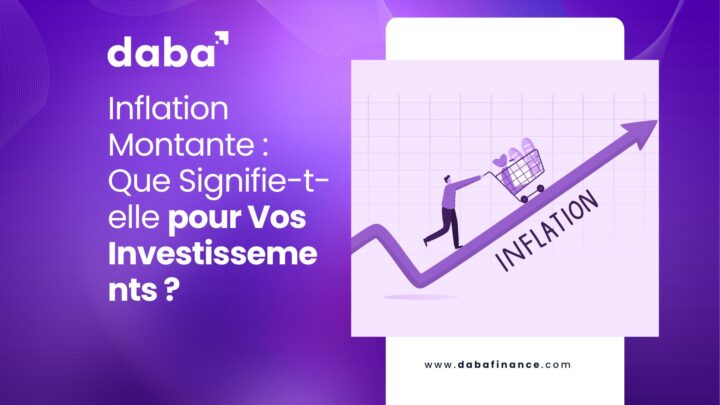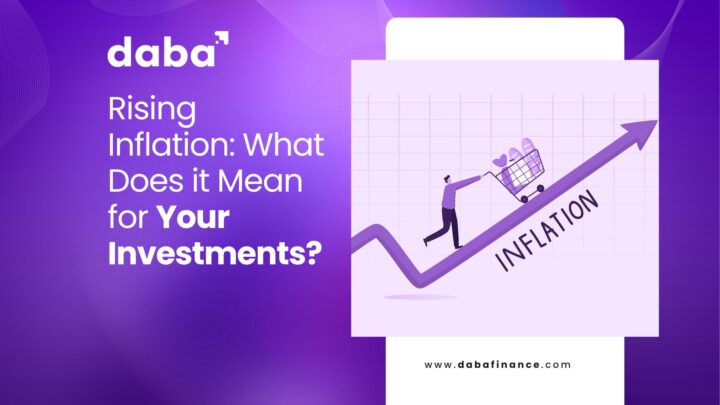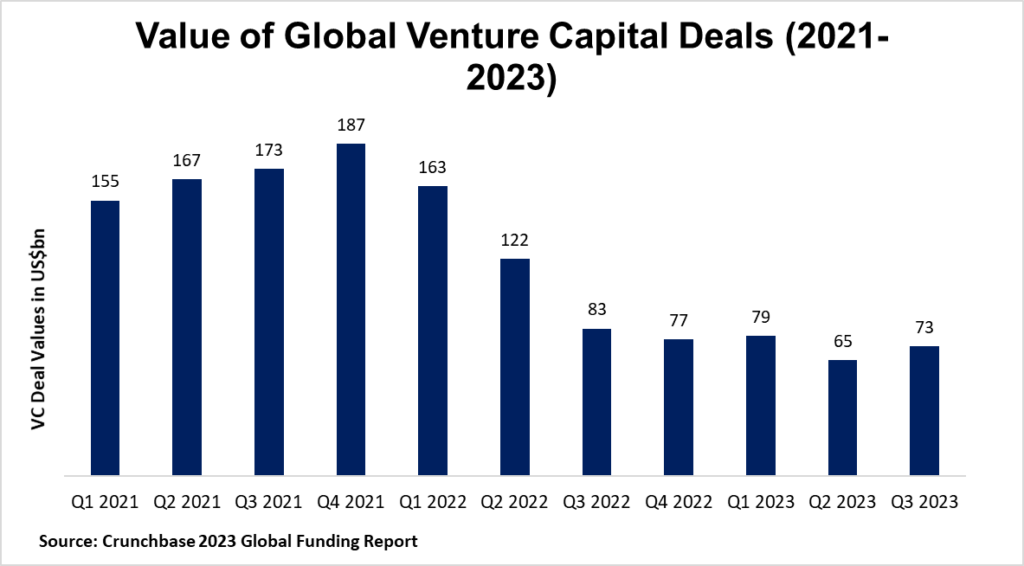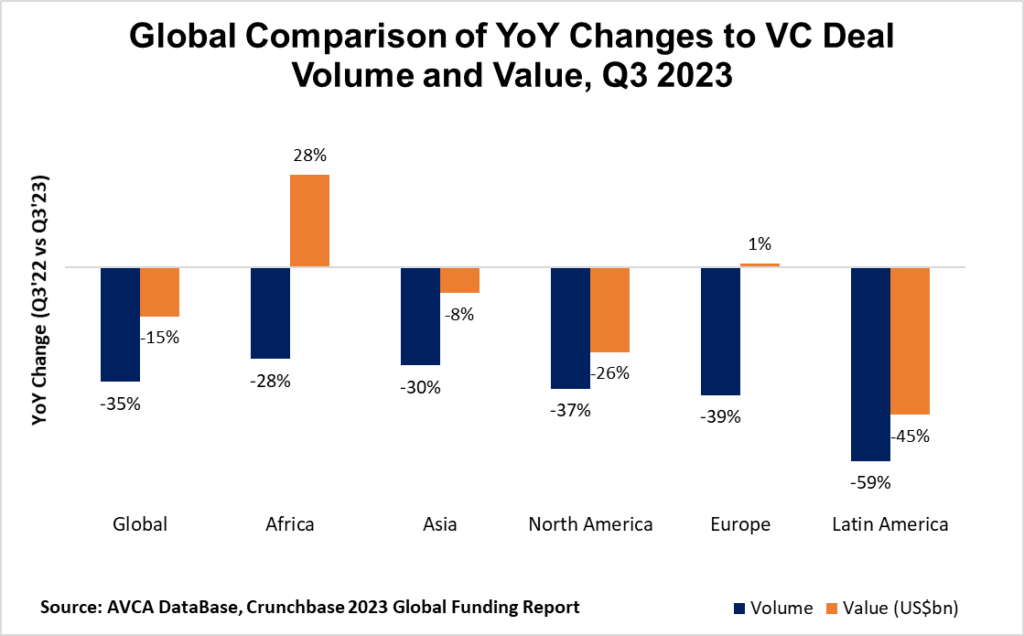Depuis 2022, l’inflation est un problème persistant qui affecte les dépenses quotidiennes de chacun.
Des courses à l’essence, le coût des essentiels augmente régulièrement, réduisant les budgets et laissant beaucoup se demander comment protéger leurs investissements.
Mais ne vous inquiétez pas, il y a un côté positif !
Bien que l’inflation puisse être difficile, elle ne doit pas nécessairement signifier la perte de votre portefeuille d’actions. Avec la bonne stratégie, vous pouvez utiliser les actions pour surmonter cette tempête inflationniste et potentiellement en tirer profit.
Cet article explore comment l’inflation impacte vos investissements, en particulier les actions. Nous allons examiner les défis de l’inflation et révéler des stratégies pour en tirer parti.
Alors, attachez vos ceintures et explorons ensemble le monde de l’inflation !
Qu’est-ce que l’Inflation ? L’étiquette de Prix sur Tout
Imaginez votre plat préféré au restaurant local. L’année dernière, il coûtait 3 000 francs CFA. Aujourd’hui, il coûte 3 500 francs CFA. Voilà l’inflation en action.
C’est l’augmentation générale des prix des biens et services au fil du temps, réduisant le pouvoir d’achat de votre argent. Un billet de 3 000 francs CFA achète moins aujourd’hui qu’il ne le faisait il y a un an.
Pourquoi l’Inflation Est-elle Importante pour les Investisseurs
L’inflation peut être une épée à double tranchant pour les investisseurs. Voyons comment :
- Érosion de la Valeur des Investissements : Les investissements à revenu fixe comme les obligations offrent un taux d’intérêt fixe. Si l’inflation dépasse ce taux, le rendement réel de votre investissement diminue. Imaginez une obligation à 5 % avec une inflation de 8 %. Vous gagnez techniquement de l’argent, mais votre pouvoir d’achat a diminué de 3 %.
- Fluctuations du Marché Boursier : Les entreprises sur les bourses comme la BRVM ne sont pas à l’abri de l’inflation. Elles peuvent augmenter les prix pour compenser la hausse des coûts. Si ces entreprises parviennent à gérer efficacement l’inflation et à maintenir leur rentabilité, leurs cours boursiers pourraient augmenter, potentiellement surpassant l’inflation.
Secteurs Qui Peuvent Prospérer en Période d’Inflation
Toutes les entreprises ne sont pas égales face à l’inflation. Voici quelques secteurs de la BRVM qui pourraient bien performer en période d’inflation :
- Consommation Courante : Les gens doivent manger, quelle que soit l’inflation. Les entreprises de la BRVM dans les biens de consommation courante, comme SONATEL (télécommunications) ou celles du secteur des biens de consommation, tendent à voir une demande stable même avec la hausse des prix.
- Finances : Les banques comme Ecobank ou Bici peuvent bénéficier de la hausse des taux d’intérêt, un outil courant utilisé pour lutter contre l’inflation. Des taux d’intérêt plus élevés signifient que les banques peuvent facturer plus pour les prêts, augmentant potentiellement leurs bénéfices.
- Matériaux : Les prix des matières premières augmentent souvent avec l’inflation. Les entreprises dans l’extraction ou la transformation de ces matériaux, comme Solibra (brasserie) sur la BRVM, pourraient voir leurs cours boursiers en bénéficier.
Stratégies pour Profiter de l’Inflation avec les Actions
Alors, comment pouvez-vous tirer parti de l’inflation sur la BRVM ? Voici quelques conseils :
- Actions Battant l’Inflation : Recherchez des entreprises ayant une histoire d’augmentation des prix et des revenus en parallèle avec l’inflation. Cela pourrait inclure des entreprises de biens de consommation courante comme les brasseries ou les producteurs de nécessités quotidiennes.
- Investir dans les Actions à Dividendes : Les entreprises qui paient régulièrement des dividendes offrent un flux de revenu régulier pouvant aider à compenser l’impact de l’inflation sur votre pouvoir d’achat. Cherchez des entreprises sur la BRVM ayant une histoire de paiements de dividendes fiables.
- Gérez Activement Votre Portefeuille : L’inflation est un processus continu. Surveillez régulièrement vos avoirs BRVM et ajustez votre stratégie d’investissement au besoin. La diversification à travers les secteurs capables de résister à l’inflation est clé.
- Diversifiez : Ne mettez pas tous vos œufs dans le même panier. Répartissez vos investissements entre différents secteurs et classes d’actifs pour atténuer le risque.
Avec la plateforme d’investissement de Daba, vous pouvez accéder à une large gamme d’actions battant l’inflation et d’entreprises versant des dividendes, garantissant que votre portefeuille reste résilient en période de difficultés. Téléchargez notre application pour commencer.
Au-delà des Actions : Autres Couvertures Contre l’Inflation
Bien que les actions puissent être un outil puissant contre l’inflation, un portefeuille bien diversifié est essentiel. Considérez ces stratégies supplémentaires :
- Les Matières Premières : Certaines matières premières, comme l’or, voient souvent leurs prix augmenter en période d’inflation et peuvent agir comme une couverture contre l’inflation.
- Les Bons du Trésor : Bien qu’ils ne soient pas directement à l’épreuve de l’inflation, les obligations d’État à court terme peuvent offrir une certaine protection contre la hausse des taux d’intérêt en période d’inflation.
- Fonds de Placement Immobilier (REITs) : Les REITs peuvent être une bonne couverture contre l’inflation. Les REITs possèdent et exploitent des biens immobiliers générant des revenus. En période d’inflation, les valeurs des propriétés et les loyers augmentent souvent, se traduisant par des rendements plus élevés pour les investisseurs en REITs.
Restez Informé : L’Inflation Est une Cible Mobile
Les taux d’inflation fluctuent et les prévisions économiques peuvent changer. Se tenir informé des actualités économiques et des projections d’inflation est crucial pour prendre des décisions d’investissement éclairées.
Daba fournit des informations fiables et des analyses d’experts pour vous aider à rester en avance sur les tendances inflationnistes et à faire des choix d’investissement judicieux. Commencez ici.
Rappelez-vous, Il Ne S’agit Pas de Battre l’Inflation, Mais de Suivre le Rythme
L’objectif en période d’inflation n’est pas nécessairement de “battre” l’inflation mais de s’assurer que vos investissements suivent au moins son rythme.
En comprenant comment fonctionne l’inflation et en faisant des choix stratégiques, vous pouvez positionner votre portefeuille pour naviguer en période d’inflation et potentiellement accroître votre richesse au fil du temps.
Chez Daba, nous donnons aux investisseurs les outils et les perspectives nécessaires pour prendre des décisions éclairées et protéger leur richesse en toutes circonstances économiques. Explorez notre plateforme dès aujourd’hui et commencez à investir en toute confiance.





